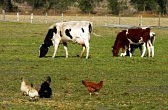Cocks and Cows Confuse too ?
 A man had some hens and cows. If the number of heads is 48 and number of feet equals 140, then the number of hens is ???
A man had some hens and cows. If the number of heads is 48 and number of feet equals 140, then the number of hens is ???
The answer is 26.
This section requires Javascript.
You are seeing this because something didn't load right. We suggest you, (a) try
refreshing the page, (b) enabling javascript if it is disabled on your browser and,
finally, (c)
loading the
non-javascript version of this page
. We're sorry about the hassle.
4 solutions
Did it the same way.....
\[\begin{cases} h + c = 48 \\ 2h + 4c = 140 \end{cases}
\implies
\begin{cases} \boxed{h = 26} \\ c = 22 \end{cases}
\]
A hen has 1 head and 2 feet while a cow has 1 head and 4 feet. Let h be the number of hens and c be the number of cows. Then,
h + c = 4 8 ( 1 )
2 h + 4 c = 1 4 0 ( 2 )
Solving the system of equations gives h = 2 6 and c = 2 2 .
Hello,
let h = hens, c= cows,
For those heads,
h + c = 48(1st equation),
For those feets,
2h + 4c = 140
h + 2c = 70(2nd equation),
solve them by substitution, or elimination, then you will get hens = 26
thanks.....
Let number of hens= x Let number of cows= y Each animal obviously had 1 head so the first equation in mathematical terms is : x + y = 4 8 A hen has 2 feet (the number of hen,s feet will be twice the number of hens) and a cow has 4 feet (the number of cow,s feet will be 4 times the number of cows) so the second equation in mathematical terms is: 2 x + 4 y = 1 4 0 Taking out the common factor 2 on both sides we get : x + 2 y = 7 0 So the system of equations we have to solve is : x + y = 4 8 → ( 1 ) x + 2 y = 7 0 → ( 2 ) With a little rearranging in ( 2 ) we get: x + 2 y = ( x + y ) + y = 4 8 + y = 7 0 Solving this, we get: y = 7 0 − 4 8 = 2 2 So number of cow= 2 2 .Plugging this value in the second equation,we get: x + 2 2 = 4 8 ⟶ x = 4 8 − 2 2 = 2 6